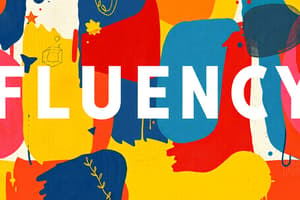Podcast
Questions and Answers
What will students be able to do after learning?
What will students be able to do after learning?
- Understand native speakers easily
- Write complex sentences
- Express their opinions and feelings in simple terms (correct)
- Read long stories
What are the main things that students will be able to express?
What are the main things that students will be able to express?
- Their emotions and expectations
- Their fears and memories
- Their dreams and desires
- Their likes and dislikes and obligations (correct)
What is the level of complexity that students will be able to express themselves in?
What is the level of complexity that students will be able to express themselves in?
- In very simple terms (correct)
- In moderately difficult sentences
- In very complex sentences
- In poetic language
What will students be able to do with their obligations?
What will students be able to do with their obligations?
What will students be able to do with their likes and dislikes?
What will students be able to do with their likes and dislikes?
What is the most polite way to ask someone to do something?
What is the most polite way to ask someone to do something?
Which of the following phrases is used to express a strong obligation?
Which of the following phrases is used to express a strong obligation?
What is the correct way to express a dislike?
What is the correct way to express a dislike?
How can you intensify a like or dislike?
How can you intensify a like or dislike?
What is the correct way to express a preference?
What is the correct way to express a preference?
Which of the following idiomatic expressions is used to express a preference?
Which of the following idiomatic expressions is used to express a preference?
What is the correct way to soften a request?
What is the correct way to soften a request?
Which of the following phrases is used to express a moral obligation?
Which of the following phrases is used to express a moral obligation?
Flashcards are hidden until you start studying
Study Notes
Language Skills
- Students will be able to express their obligations in simple terms.
- They will be able to state their likes and dislikes using simple language.
- The language skills focus on enabling students to communicate their personal preferences and responsibilities effectively.
Making Requests
- Use polite language to make requests, including "Can/Could you...?", "Would you...?", and "Do you think you could..."
- Soften requests with phrases like "I was wondering if...", "Would it be possible to...", and "Could I possibly..."
- Use modal verbs to express degrees of politeness, such as "Can" (more direct), "Could" (more polite), and "Would" (even more polite)
Stating Obligations
- Express obligations using modal verbs, including "Must" (strong obligation), "Have to" (strong obligation), "Need to" (necessary obligation), "Should" (moral obligation), and "Ought to" (moral obligation)
- Use phrases to express obligation, such as "It's necessary to...", "I'm required to...", and "I'm supposed to..."
Talking About Likes And Dislikes
- Express likes using phrases like "I like...", "I love...", "I'm fond of...", and "I enjoy..."
- Express dislikes using phrases like "I don't like...", "I hate...", "I dislike...", and "I'm not fond of..."
- Intensify likes and dislikes with adverbs, such as "I really like...", "I absolutely love...", and "I thoroughly dislike..."
Expressing Preferences
- Express preferences using comparative forms, such as "I prefer...to..." and "I'd rather...than..."
- Use phrases to express preferences, such as "I'd prefer it if...", "I'd like it better if...", and "If I had a choice, I'd..."
- Use idiomatic expressions to express preferences, such as "I'm more of a...person" and "I'm not really into..."
Studying That Suits You
Use AI to generate personalized quizzes and flashcards to suit your learning preferences.




